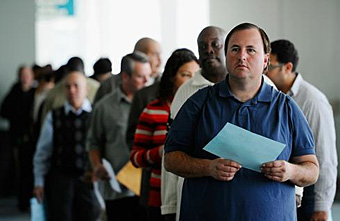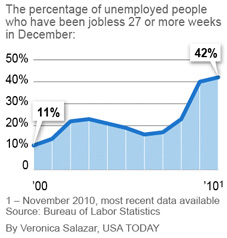
|  |  |  Business News Business News  
U.S. Changes How It Measures Long-Term Unemployment
 Rick Hampson - USA Today Rick Hampson - USA Today
go to original
January 03, 2011


| | Job seekers line up to enter Choice Career Fair on Dec. 1 at the Los Angeles Convention Center. (Kevork Djansezian/Getty Images) |  |
So many Americans have been jobless for so long that the government is changing how it records long-term unemployment.

Citing what it calls "an unprecedented rise" in long-term unemployment, the federal Bureau of Labor Statistics (BLS), begun Saturday, will raise from two years to five years the upper limit on how long someone can be listed as having been jobless.

The move could help economists better measure the severity of the nation's prolonged economic downturn.

The change is a sign that bureau officials "are afraid that a cap of two years may be 'understating the true average duration' — but they won't know by how much until they raise the upper limit," says Linda Barrington, an economist who directs the Institute for Compensation Studies at Cornell University's School of Industrial and Labor Relations.

Likening recessionary unemployment spikes in recent decades to a storm at sea, she says, "The waves are getting higher, and we want to understand the intricacies of how they're made up."

The change involves the form used for the bureau's Current Population Survey, based on interviews with thousands of the unemployed. Currently, no matter how much longer than two years someone has been out of work, the form allows interviewers to check off only "99 weeks or over." Starting next month, jobless stints of "260 weeks and over" can be selected on the response form.

"The BLS doesn't make such changes lightly," Barrington says. Stacey Standish, a bureau assistant press officer, says the two-year limit has been used for 33 years.

 A two-year limit hampers economists' ability to compare this recession's effect on the job market with another severe one in the early 1980s, Barrington says. A two-year limit hampers economists' ability to compare this recession's effect on the job market with another severe one in the early 1980s, Barrington says.

Although "this feels like something we've not experienced" since the Great Depression, she says, economists need more information to be sure.

The change will not affect how the unemployed are counted or the unemployment rate is computed nor how long those eligible for unemployment benefits receive them. Analysts call the move a sign of the times.

"We realize more and more people are unemployed longer than 99 weeks, so we need to break it down further," Standish says.

Long-term unemployment has grown markedly over the past few years. The BLS says the average length of unemployment has increased from 29.4 weeks in November 2009 to 34.5 weeks last month. Nearly 10% of the USA's 15.1 million jobless have been looking for work for two years or more.

Rick Bartz, 59, of Cary, N.C., a purchase and supply expert, was laid off by Sony Ericsson's struggling North Carolina operation eight months ago.

"It puts a lot of stress on me and the wife," he says. "She gets tired of me not being able to find something." He says that lately he's been able to get just a few interviews.

Some workers despair. "I don't know when I'll work again," says Ricky Browner, 30, of Passaic, N.J., who lost his construction job two years ago. "This thing goes on and on."

Heidi Shierholz, a labor economist at the Economic Policy Institute, a Washington think tank, says most economists expect hiring to remain sluggish in 2011 before improving in 2012.
|

 |
|  |



